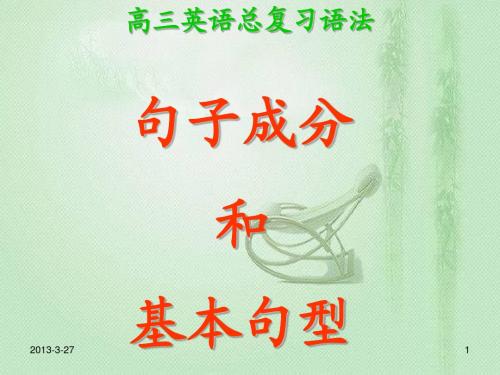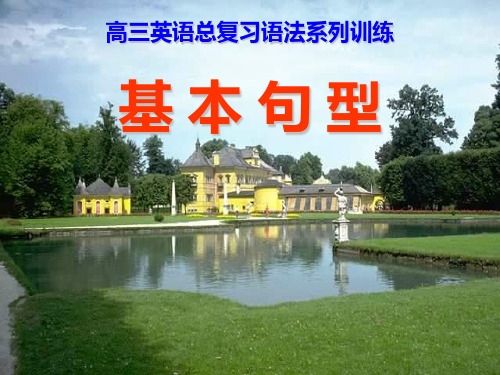2011届高三英语总复习句型结构
- 格式:doc
- 大小:55.00 KB
- 文档页数:5



高三英语语法专项复习句子结构和成分句子结构及成分考点1.实义动词、助动词与情态动词实义动词和助动词是根据动词在句子中的含义和作用来划分的。
实义动词也叫行为动词。
实义动词指的是那些意义完全且能够独立作谓语的动词。
如:He lives quite near. (live“住”,有明确的意义,单独作谓语,为实义动词)I bought a pen yesterday. (bought “买”,意义明确,单独作谓语,为实义动词)助动词助动词是指那些用来帮助构成时态、语态、虚拟语气、疑问句、否定句和倒装句和帮助强调的词。
这些词本身无词汇意义或意义不完全,不能单独作谓语。
⑴帮助构成时态的:The boy is crying.(is 用来构成现在进行时,和crying一起作谓语,是助动词)I have been painting all day. (have been用来帮助构成现在完成进行时,和painting 一起作谓语,是助动词。
)⑵帮助构成否定句和疑问句的:Does he like English? (does帮助构成一般疑问句,没有具体意义,是助动词。
)He does n’t have lunch at home. (does只是帮助构成否定句,没有具体意义,是助动词。
)⑶帮助构成被动语态的Trees are planted in spring. (are帮助构成被动语态,没有具体意义,是助动词)The house has been pulled down. (has been帮助构成时态和语态,是助动词)⑷帮助构成虚拟语气If he had n’t have made such a mistake.(had, have帮助构成虚拟语气,是助动词,属于谓语的一部分。
)⑸帮助构成倒装句的So did he love his mother that he bought her many presents on her birthday.(他如此爱他的母亲以至于他母亲生日那一天,他给她买了许多礼物。

高中英语句型结构大全在高中英语学习中,学生们需要掌握并灵活运用各种句型结构,以表达自己的意思和思想。
下面是高中英语常用句型结构的详细介绍。
一、主谓结构主谓结构是最基本的句型结构,由主语和谓语组成。
主语通常是名词或代词,谓语则为动词或动词短语。
1. The cat sleeps.这只猫在睡觉。
2. Lucy goes to school every day.露西每天上学。
二、主谓宾结构主谓宾结构由主语、谓语和一个宾语组成。
宾语通常是名词、代词或动名词。
3. She gave me a book.她给了我一本书。
4. They are watching a movie.他们正在看电影。
三、主谓表结构主谓表结构由主语、谓语和一个表语组成。
表语可以是形容词、名词或名词短语。
5. He is a doctor.他是一名医生。
6. The weather is sunny today.今天天气晴朗。
四、主谓宾表结构主谓宾表结构由主语、谓语、一个宾语和一个表语组成。
表语可以是形容词、名词或名词短语。
7. They made him the captain of the team.他们让他成为队长。
8. We elected her president of the club.我们选她为俱乐部主席。
五、主谓双宾结构主谓双宾结构由主语、谓语和两个宾语组成。
其中一个宾语通常是人,另一个是物。
9. She bought me a gift.她给我买了一份礼物。
10. He taught his students English.他教他的学生英语。
六、There be结构There be结构用于描述某个地方存在或发生的事情。
它由there + be构成,be后面是主语。
11. There is a cat in the garden.花园里有一只猫。
12. There are two books on the table.桌子上有两本书。


第三部分第[讲写作突破句子结构英语句子的基本结构可以归纳为五种基本句型及扩大、组合、强调、倒装和省略。
掌握这五种基本句型,是掌握各种英语句子结构的基础。
陈述句的五种基本句型是写作的基础,掌握了这五种基本句型,就具备初步的写作能力了。
从最近几年高考阅卷情况分析,只要能用简单句表述规定的内容要点,就可以拿到及格分数。
【基本句型一】主语+不及物动词此句型的句子有一个共同特点,即句子的谓语动词都能表达完整的意思。
这类动词叫做不及物动词,后面可以跟副词、介词短语、状语从句等。
女II:The rain stopped•雨停了。
The old man waited•那老人等着。
本句型的扩展句式如下:1.主语+不及物动词+副词(作状语)。
女LI:The machine works smoothly.机器运转顺畅。
He listened attentively.他认真听讲。
2.主语+不及物动词+不定式(作目的状语)。
女口:They stopped to take a short rest•他们停下来休息。
He worked hard to make his dreams come true•他努力匚作以实现梦想。
3.There+不及物动词+主语。
如:There comes the bus.公共汽车来了。
【活学活用】请用“主语+不及物动词”的句型翻译下列句子。
1.太阳在照耀着。
I I I I The sun was shining.4.我们大家都要呼吸、吃和喝。
We all breathe, eat and drink.5.他所讲的没有什么关系。
(matter) What he said does not matter.10.他每年在外旅游好几个月。
He travels for several months every year.11・会议将持续三个小时。
The meeting will last three hours.12.1919年,北京爆发了“五四”运动。
高中英语常见句型结构总结在学习高中英语的过程中,掌握常见句型结构是非常重要的一部分。
通过熟练掌握各种句型结构,可以帮助我们更好地理解和运用英语语法,从而提高语言表达的准确性和流畅性。
下面将对高中英语中常见的句型结构进行总结和归纳。
一、简单句结构1. 主谓结构主语+动词:例如,“Tom studies.”(汤姆学习。
)2. 主谓宾结构主语+动词+宾语:例如,“She reads a book.”(她读书。
)3. 主谓宾补结构主语+动词+宾语+补语:例如,“He made me happy.”(他让我开心。
)二、并列句结构1. 并列句两个或多个句子并列在一起,用连词连接:例如,“I like playing basketball, and my brother likes playing football.”(我喜欢打篮球,我弟弟喜欢踢足球。
)三、从句结构1. 定语从句用来修饰名词的从句:例如,“The book that I bought is interesting.”(我买的那本书很有趣。
)2. 状语从句用来修饰动词、形容词或副词的从句:例如,“I will go to b ed after I finish my homework.”(我完成作业后会去睡觉。
)四、特殊句型1. 倒装句主语和谓语的位置颠倒:例如,“Here comes the bus.”(公交车来了。
)2. 强调句强调句型的构造:例如,“It is Tom who won the game.”(赢得比赛的是汤姆。
)在学习英语句型结构时,要注意识别各种句型的特点,并结合实际情况进行灵活运用。
通过不断的练习和积累,我们可以逐渐提高对句型结构的把握能力,从而更好地运用英语进行交流和表达。
以上是高中英语常见句型结构的总结,希望对大家的学习有所帮助。
让我们一起努力,提升英语水平!。
高三英语句子结构讲解(彻底搞清句子结构)句子结构1.英语句子的基本结构可以归纳成五种基本句型及其扩大、组合、省略或倒装。
掌握这五种基本句型,是掌握各种英语句子结构的基础。
2.英语五种基本句型结构如下:SV(主+谓)SVO(主+谓+宾)SVoO(主+谓+间宾+直宾)SVOC(主+谓+宾+宾补)SVP(主+系+表)主语(subject)谓语(predicate)宾语(object)定语(attribute)表语(predicative)1). 基本句型一:SV(主+谓)这类句子的谓语动词都是不及物动词,都不带宾语,但可以带状语。
2). 基本句型二:SVO(主+谓+宾)此结构是由“主语及物动词(词组)宾语”构成。
3). 基本句型三:SVoO(主+谓+间宾+直宾)有些及物动词可以有两个宾语,如:give“给”,pass“递”,bring“带”,show“显示”。
这两个宾语通常一个指人,为间接宾语;一个指物,为直接宾语。
间接宾语一般位于直接宾语之前。
一般的顺序为:动词间接宾语直接宾语。
例如:He gave me a cup of tea. (SVoO)强调间接宾语顺序为:动词直接宾语介词(to\for)间接宾语。
例如:Show this house to Mr. Smith.若直接宾语为人称代词时,只能用:动词代词直接宾语介词间接宾语。
例如:Bring it to me, please. (不能说 Bring me it, please.)常跟双宾语的及物动词有:(需借助to的)allow, bring, deny, give, grant, hand, leave, lend, offer, owe, pass, pay, permit, promise, read, refuse, sell, send, show, teach, tell, wish, write等。
(需借助for的) buy, choose, fetch, get, make, order, paint, play(演奏), save, sing, spare等。
高考英语总复习重点句型资料句型1as, though, although引导的让步状语从句。
[注意]although位于句首;though位于句首或句中;as位于句中=though。
它的词序是把句中强调的形容词、副词、动词或名词放在连词前。
[参考倒装结构] 请注意下列句式的变化:[例句]1. Although/Though I’m young, I already know what career I want to follow.→Young as/though I am, I already know what career I want to follow.我虽然年轻,但我已经明白我应该追随什么样的事业。
2. Although/Though I respect him very much, I cannot agree with his idea.→Much as/though I respect him, I cannot agree with his idea. 虽然我很尊重他,但是我不同意他的观点。
3. Although/Though he is a child, he knows a lot of Chinese characters.→Child(省略冠词)as/though he is, he knows a lot of Chinese characters. 他虽然还是个孩子,却认识了许多汉字。
4. Although he tried, he couldn’t solve the problem.→Try as he might, he couldn’t solve the problem. 尽管他努力了,但是他没有解决问题。
5. Although it is raining, I’m going out for a walk.→Raining as it is, I’m going out for a walk. 天虽然在下雨,我还是要出去散步。
号顿市安谧阳光实验学校高考句式结构361.It is/was + 被强调部分 + that/ who…Who / What / When / Where / How / Why…is / was + it + that …?2.It is/was + adj./n./P.P..+ that / what / who / whom / whether / when/ where / why…3.It is / was adj. + for sb. to do…4.It is / was + adj.( good / kind / nice / wise / clever / silly / stupid/ foolish / right / wrong / rude / polite / impolite / careful / careless…) + of sb. to do…5.It is time ( for sb.) to do sth…/for sth到了该做…的时候It is (high) time (that) + 主语 + 过去式…早该做…还没做…6.It is+ three years… + since + 主语 + did 自从…有多久了It was+ three years… + since + 主语 + had done7.It is / was / will be…(not) long + before…过…多久才,不久就…It is / was not until…that…8.vt.--- think / find / suppose / believe…+ it + adj./n. + to do /doing / that…9.条件分句 (祈使句 / 短语) ,+ and / then / or + 结果分句 (将来时)10. There be / lie / stand / exist / live / come / follow / flow / enter/ remain…+ 主语…There is/was + no use / good + doing…There is/was + no need to do…/for ed to do / be… be / get used to doing… / sth.be used to do…/ for sth12.The + 比较级 + 主语 + 谓语…, the + 比较级 + 主语 + 谓语…比较级 + and + 比较级13.twice / three times / 60% / two thirds…+ 比较级+ than…/ as + 原级+ as…14.would rather (not) do …than dowould rather + 主语 + 过去式…would like/love (sb.) + to do…Would you mind doing…/if….?(not) feel like doing / sth.prefer to do…rather than+ do….prefer doing…/ sth….to doing…/sth.15.have been / have gonehave sth./sb. + done / doing / do…have sth./sb. + to do / to be done…with + sb./sth + to do / doing / done/ prep.短语/ adj./ adv.…16.vt.---mind / enjoy / finish / practise / admit / appreciate / avoid/ escape / suggest / delay / imagine / face / keep / forgive / excuse / miss / prevent / risk / understand / stand / be worth / be busy…+ doing…17.vt.--- aim / attempt / choose / want / wish / hope / agree / promise/ decide /determine / manage / fail / pretend / prepare / prove /refuse / expect / tend / wish / wait / offer… + to do…18.Prep “to”---lead to / refer to / stick to / owe to / thanks to / due to / belong to/connect to / join to/ compare to / according to / get down to / devote to/ object to / look forward to / pay attention to / be used to…19. vt.---let / make / have / see / hear / watch / listen to / look at / notice / observe ...+ sb./ sth. + do…( 被动式to do…) / doing… / done20.remember to do…forget to do…doing…doing…mean to do…try to do…doing doingregret to do…doingstop to do go on to do…doing doing…21. vt.--- need / want / require… + doing … / to be done22.部分倒装--- No / Not / Never / Neither / Nor / Hardly / Seldom /Only / Such / Scarcely / Rarely / Nowhere / Not until / At no time / On no account / In no way / by no means / No longer / No more / No sooner / No less / So…+助动词 +主语+V…. Hardly + 倒装式 had + 主语+done …when…did…No sooner + 倒装式 had + 主语+ done + than…did…Not until…+ 主句倒装式 did + 主语+do…It is / was not until…that…全部倒装---There / Here / Then / Now / Up / Down / In / Out / Such … + 谓语 + 主语…23.So + 主语 + be / have / can / do。
2011届高三英语总复习句型结构1. ____ you think will make a trip to Paris?A. Who can it be thatB. Whom doC. Whom can it beD. Who will it be2. —Where was it____ the road accident happened yesterday?—In front of the market.A. whenB. thatC. whichD. how3. It is not until you have lost your health____ you know its value.A. thatB. whenC. whatD. which4. ____ he realized it was too late to return home.A. Not until darkB. It was until dark thatC. It was not until dark thatD. It was dark that5. —Was it two months ago ____ you luckily got an opportunity to spend your holiday in Canada?—____. John was the lucky dog.A. when; Not IB. when; Not reallyC. that; Not at allD. that; Not me6. It was ____ I met Mr Smith in London.A. many years thatB. for many years sinceC. since many years ago whenD. many years ago that7. It is the protection for the trees ____really matters,rather than how may trees are planted.A. whatB. thatC. 不填D. which8. It is only when you nearly lose someone ____ you fully realize how much you value him.A. doB. thenC. willD. that9. It was not until dark ____ he found ____ he thought was the correct way to solve the problem.A. that; whatB. that; thatC. when; whatD. when; that10. The truth is that it is only by studying history ____ learn what to expect in the future.A. can weB. that we canC. and then we canD. so that we can11. Was it through Mary,____ was working at a high school,____ you got to know Bob.A. who; whoB. who; thatC. that; thatD. that; where12. It was at the very beginning ____ Mr Smith made a decision ____ we should send for a doctor.A. when; whichB. that; whichC. when; thatD. that; that13. It was in the lab ____ was taken charge of by Professor Zhang ____ they did the experiment.A. where; thatB. which; whereC. that; whereD. which; that14. It was in Beihai Park____ they made a date for the first time____ the old couple told us theirlove story.A. where; thatB. that; thatC. where; whenD. that; when15. It is in Qingdao____ you’re going to pay a visit to____ this kind of washing machine isproduced.A. 不填;thatB. where; whichC. 不填;whereD. that; which16. It was not until dark____ he found____ he thought was the correct way to solve the problem.A. that; whatB. that; thatC. when; whatD. when; that17. ____ entered the office when he realized that he had forgotten his report.A. He hardly hadB. Had he hardlyC. Hardly had heD. Hardly he had18. ____ land is improved by sowing it with various seeds,____ is the mind by exercising it withdifferent studies.A. As; asB. As; soC. If; soD. When; so19. ____ me the truth,or I’m not going to leave the room.A. TellB. TellingC. To tellD. If you tell20. Every language____ more than 100,000words,but____ are not used very frequently.A. includes,manyB. contains,many of these wordsC. has,many of whichD. owns,many of them21. —I am sorry I failed in persuading him.—____,and you will succeed.A. Making one more effortB. Make one more effortC. To make one more effortD. One more effort made22. He moved away from his parents and missed them ____ enjoy the exciting life in New York.A. much so as toB. very much toC. too much toD. enough to23. Sandy could do nothing but ____ to his mother that he was wrong.A. admittingB. admitsC. admitD. to admit24. ____ Mary ____ Sue knows nothing about the matter,____ they didn’t come to the school lastFriday.A. Either; or; becauseB. Both; and; asC. Neither; nor; sinceD. Not only; but; for25. Not only____ it,but also____ it for ourselves.A. did we hear; we sawB. we heard; did we seeC. we heard; we sawD. did we hear; did we see26. —By the way,when shall I come and get the reference books?—Would ____ come and get them at five tomorrow afternoon?A. you ratherB. it better for you to getC. it be all right for you toD. you be all right to27. Unfortunately,it is too late____ any taxi. So we have to walk home.A. to beB. for there to beC. to have beenD. being28. The old man had a letter from his daughter ____ to him.A. readB. writtenC. writingD. received29. ____ he returns to his hometown.A. It is long before thatB. It is before long afterC. It will be before long thatD. It won’t be long before30. It will be a long time____ Mr Black ____ back from abroad.A. before; comesB. since; has comeC. before; will comeD. after; will come31. Scientists say it may be five or ten years ____ it is possible to test this machine on humanpatients.A. sinceB. whenC. afterD. before32. As a public relations officer,he is said ____ some very influential people.A. to knowB. to be knowingC. to have been knowingD. to have known33. —Li Ming is said ____ abroad. Do you know what country he studied in?—Yes. In London.A. to have studiedB. to studyC. to be studyingD. to have been studying34. The baby was on the point of crying ____ her mother finally came home.A. whenB. unlessC. whileD. until35. I____ to have supper____ he returned.A. was about; whileB. am about; whenC. was just about; whenD. was going; while36. I felt somewhat disappointed and was about to leave____ something occurred which attractedmy attention.A. unlessB. untilC. whenD. while37. We hadn’t been out for long,____ she felt sick.A. asB. whenC. whileD. after38. —What was the party like?—Wonderful. It’s years____ I enjoyed myself so much.A. beforeB. whenC. sinceD. after39. —It’s a long time____ I saw you last.—Yes,and it will be a long time____ we meet again.A. that; untilB. since; beforeC. when; thatD. before; since40. Don’t forget it’ll be the first time ____ in public.A. I’ve spokenB. I shall speakC. I will speakD. I speak41. Everyone____,the chairman____ and the meeting began.A. arrived; took his placeB. having arrived; take placeC. came; took his placeD. having arrived; took his place42. It seems____ the dress is a bit too large for me. Can I change it____?A. even if,into a smaller oneB. as if,for a smaller oneC. as though,to a bit smallerD. even though,for the smaller one43. ____ the students were hearing the exciting news!A. How pleasedB. What a funC. How happilyD. What pleasure44. —How would you like your coffee?—____.A. It’s well doneB. Very nice. Thank youC. One cup. That’s enoughD. The stronger,the better45. Excuse me. If your call is not too urgent(紧急的),do you mind ____ mine first?A. I makeB. if I makeC. me to makeD. that I make46. If we keep on polluting the environment,the white plastic rubbish will be the last thing to tellother creature that “____once an earth. ”A. there wasB. there isC. it isD. it was47. While watching TV,____.A. the telephone rangB. I heard the telephone ringingC. the telephone was ringingD. the telephone was heard ring48. —What’s the matter with you?—____ the heavy suitcase,my waist was hurt unexpectedly.A. CarryingB. CarriedC. While carryingD. While I was carrying49. As a boy of six,____.A. Tim’s parents asked him to play the piano every dayB. Tim and his parents would play the piano togetherC. Tim had to practise playing the piano every dayD. To learn playing the piano is too hard for Tim50. Just after putting away the dishes,____.A. the door bell was rungB. Mother heard the doorbell ringC. Someone knocked at the doorD. the doorbell rang loud51. Hands ____ behind his head,John lay on the sand with his eyes looking straight upward intospace.A. crossingB. were crossedC. crossedD. had crossed52. To speak English freely,____.A. a lot of speaking should be done.B. more speaking is necessaryC. you should do more speakingD. English should be spoken very often53. All the preparations for the task____,and we’re ready to start.A. completedB. to completeC. had been completedD. have been completed54. Isn’t ____ rude ____ him to talk to his mother like that?A. that; forB. that; ofC. it; forD. it; of55. It was because of bad weather ____ the football match had to be put off.A. soB. so thatC. whyD. that56. Word came ____ the British Queen Mother celebrated her 101st birthday in good health,____isn’t surprising,because she lives an easy life and gets the best medical care.A. that; whichB. which; whichC. that; thatD. when; as57. She wondered ____ she could have the opportunity to spend ____ here ____ she could learnmore about the city.A. if; some time; so thatB. how; sometime; so thatC. when; some times; thatD. if; some time; such that58. When they went into the shop and asked to look at the wedding rings,the girl brought out thecheaper ones,____ she had arranged with James.A. those were whatB. what was thatC. which was whatD. that was what59. Is this hotel____ offered you a job____ you stayed the first time you arrived here?A. which; whereB. the one; in whichC. where; thatD. the one that; where60. Peter won’t drive us to the station. He has ____ to take us all.A. a very small carB. too small a carC. a too small carD. such a small car61. —Tom wants to stay up and watch an old movie on TV.—Ten o’clock is ____ for a boy of his age to stay up.A. too late an hourB. too later an hourC. an hour too lateD. an hour too later62. —Now that you like the house so much,why not buy it?—Well. I can’t afford ____ house.A. that big aB. a that bigC. that a bigD. a big that63. T hese shoes cost ____. What’s more,they are ____ small for me.A. much too; too muchB. too much; much tooC. very much; veryD. very much; too much64. I’m afraid I’ll turn to Prof. Tomlinson. It is____.A. too difficult a problemB. a too difficult problemC. so difficult problemD. a so difficult problem65. I haven’t seen____ this since I began to collect stamps.A. as old a stamp asB. as an old stamp asC. an old stamp asD. a such old stamp as66. Believe it or not,he came ____.A. home drunk last nightB. home last night drunkC. last night home drunkD. drunk home last night67. —Will you be sent abroad for further studies?—I have ____!A. no such luckB. such no luckC. no such a luckD. not such a luckKey:ABACD DBDAB BDDAA ACBAB BCCDA CBADADAAAC CBCBA DBADB ABDCB CCDDD AACABAABAA AA。